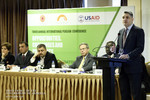Friday, 21 February 2014
Prime Minister Tigran Sargsyan’s Statement At Third Annual Pension Forum
Dear Colleagues,
On behalf of the Government of the Republic of Armenia, I welcome you and wish fruitful work.
The topic on our agenda is extremely important all over the world now. Forums like this help us discuss the modern world’s most effective pension systems, review the existing shortcomings and achievements so that we could amend the model we have developed and applied in Armenia.
First of all, I would like to note that a public spotlight is kept on the concept designed for our country by two Presidents, three governments and four coalition parties. This is the outcome of our joint effort. Now, let us look at the motivations that have driven us to make this drastic change, as well as to understand whether there is an alternative. I will try to touch on these issues.
Firstly, the current system, which is called a system of intergenerational solidarity, has the following logic. Armenia’s half a million income tax payers are supposed to contribute such an aggregate amount of income tax as will be enough to provide a decent pension to our pensioners. Is it possible or not?
The old system, the system of solidarity between generations, which is applied throughout the world, was based on the logic that the pensioners’ life expectancy will allow the younger generation to supply the necessary amount of pension. But the world has seen two dramatic changes. Firstly, the demographic change, including the decline in the birth rate, which is the most important challenge, because some developing countries, including the Republic of Armenia, are deemed as ageing nations. Thus, the younger generation is decreasing in number, while the number of retirees is going up. This creates a fundamental problem in the old system.
Secondly, life expectancy keeps growing throughout the world, especially in developed and developing countries, including Armenia. Average life expectancy is 74 years in Armenia. This means that the above two factors have an adverse impact on the on the system applicable in Armenia to make it problematic. This is why pension reform is considered to be one of the most serious challenges in the 21st century. Why most serious? Just because the transition will be painful: on the one hand, and the States must provide today’s pensioners with such pensions as will secure a prosperous and dignified old age for them and, on the other hand, they need to move to a new system, which is an extra burden for the budget.
Thus, while the developed nations are facing an impasse, the international experts keep suggesting us that Armenia has a historic chance, an opportunity not to be missed.
So, roughly, we have some 500 thousand income tax payers in our country. Today’s 550 thousand pensioners are paid such a pension that is driving to poverty the overwhelming majority of them. That is, any citizen of Armenia comes to face the problem of poverty, because the averages pension of 36 thousand dram is not sufficient to ensure a happy old age. 350 thousand pensioners live below the poverty level in Armenia. This is a very serious problem, and if we take the number of the extremely poor, we will understand how serious the problem is.
Our critics, opponents keep insisting that there is an alternative, namely better tax administration, including higher taxes charged to the oligarchs. It is a rightful demand and we are going that way. But going that way, we can only address the problem of today’s retirees. We operated a fundamental change in the GDP-taxes ratio through a 1.4% increase in this ratio, which is a revolutionary measure for the past 10 years, because as you may remember, our target used to be 0.3-0.4% annually. The above 1.4 percent increase allowed us to raise the pensions by 15% since January 1, 2014. We will continue with this strategy, the more the taxes-GDP ratio improves, the more we will be able to increase the pensions.
But a question may arise: and what about the second problem that is the pension to be paid to the rising generation? How can we address it, if we are an ageing society with increased life expectancy, while there is a demographic trend consisting in that the number of active population will be much smaller in 15 or 20 years?
The main drawback of the old system is that there is no cohesion between the pensioners’ service record and earned income, on the one hand, and the pension itself, on the other.
How much will they will get in pension will be dependent on which financial stage will the State find itself at the time of retirement? If it is in good condition, they will get a bit better pension, if the State is in a slightly worse condition, they will paid a lower pension. Their service record has nothing to do with the pension and secure old age.
To resolve this issue, the arguments of our opponents are inconsistent not only in Armenia, but all over the world, because from this point of view, the old system does not offer solutions. There is another way - to increase the retirement age. You may remember that France embraced that path and we saw tremendous social problems faced by the authorities, because people keep saying: we have found a job and planned to retire at 63 years of age, and now we are 63 years, and what moral, legal basis you have now to change all our planned life cycle? This is a massive social and political issue. It is a drawback of the old system, because all the developed States will face it.
The State budget is not enough to increase pensions, because the tax burden on workers becomes unbearable that impairs the motivation for productive work, hitting the economy. Therefore, neither this argument is effective since it really degrades the welfare status of the country, despite the fact that many countries have resorted to the second option and we saw what the excitement was in Belgium when the Belgian government said: dear citizens, we can no longer meet the social burden that the State has assumed. Let us give up some commitments taken by the State, because the State budget cannot stand it anymore. We saw 3.5 million people take to the streets a small Belgium to protest against those legislative changes because they had planned their lives, taking into account the legislative framework applicable in their country. They say not to be ready for such an amendment and suggest finding other solutions.
Modern economics has addressed this issue comprehensively, and we are grateful to international organizations, the United States Government, the USAID, the World Bank, and the European Investment Bank, which stood by us and gave us the best international know-how.
We had the opportunity to get familiar with the analysis made by the best specialists in the world, sending our young professionals in various countries to explore the best practices available. On the basis of such advanced knowledge, we have created our own system.
What is the logic of our system? Every employee is responsible for his or her its secure old age. Since then, as you have a job and income, you are required to think about your secure old age together with State. Here is the political rationale. It can be opposed by such forces advocating a socialist ideology. But even they, if we look at the developed world, are already changing their ideological principles over the pension system, seeing that the arguments available today are overwhelming ones, and the principle of solidarity between generations will not be able to overcome those insurmountable circumstances under the socialist principles. Therefore, we need to find an alternative, and it is contained in the aforementioned political and ideological principle.
Any working citizen should bear responsibility for a secure old age together with the State by saving from the very moment he gets income. There is no country in the world to have introduced a mandatory funded system and spared public dissatisfaction.
Armenia is not an exception. And it is just and fair discontent. Such opposition is vital to a democratic civil society. Why? Because when the authorities use a tool of coercion, society must necessarily treat it with suspicion so that the authorities should be vigilant and desirous to improve this tool so that the deficiencies have been minimal and the institution of coercion could achieve its goal.
Therefore, we must respect our opponents’ approaches and make a great effort to expose the benefits and its necessity by addressing all those questions they raise.
So the number one question is that of public trust. Our opponents say we have suspicions that these amounts will be scattered and lost over the years, so we had better spend today these five percent, because we have many concerns, socio-economic situation in Armenia is unfavorable, there is the problem of poverty, households get insufficient income and we had better consume the five percent rather than to save it for a secure old age, the more that we do not believe that in 35-40 years, these amounts will be made available to us.
This is an objective question because there are objective bases, namely 32.5 % of our population lives in poverty and the middle class is just being formed with still insufficient incomes.
What have we planned? We are going to mitigate the bases for this objective discontent? In 2010 we passed the law and, in this respect, it is an exceptional law, because our history has not seen a law to take 3 years to become effective. We passed it in 2010 and gave three years to our citizens and businesses to get prepared for its enactment as of January 1, 2014. We used to be criticized for adopting a law and enforcing it within 2-3 months. It was an exceptional law adopted three years ago, which gave everyone the chance to get prepared, including us.
The State has built up funds firstly in order to raise pensions from January 1, secondly, to raise wages, thirdly so that we could have 20 billion drams in the treasury to encourage young people to redouble their accumulated five percent savings up to 10%. We have been getting ready for three years now.
Fourth, we have planned to increase the minimum wage over five years, giving an indication to the private sector that they shall be required to gradually raise wages and incomes in the Republic of Armenia. Sixth, for the first time since the crisis in 2013, we managed to overcome the fundamental problem of ensuring growth in real incomes of our citizens.
In 2013, we were able to solve this problem: real wages grew 6.5 %, inflation - 5.8%. In 2014, price increases will be lower than the growth in real incomes. This will make that the said five percent were not painful this year, the real incomes might grow, thereby mitigating this transitional phase. The figures testify to that and this is another major problem.
The following criterion of trust is that the money would not be lost. We are reminded of the story of the Savings Bank of the Soviet Union. The powerful world empire had a bank with monopoly over people’s savings. Who would have thought that the bank would collapse, but it collapsed? Armenia proved to be the hardest-hit country by the crash because of the 15 republics we had the highest per capita savings.
Now what should be a system like that even in the event of such a collapse our citizens would not lose their funds accumulated over 35-40 years? Let us once again appeal to the international experience. To do this, there are a number of ways. Firstly, your savings funds should be diversified. They should not be kept only in a Savings Bank and they should not be in the same State.
Your savings should not be dependant on the fate of a single State: they should be diversified in various States by means of different securities. Secondly, they should represent reliable bonds with a high return. Any such bonds must have an exceptional, highly rated value. If you look at the global experience of the past 80 years, when the funded systems started operating, you can see that there was no such fund operating on these principles of reliability went bankrupt.
This is the answer to the second question of our opponents. They keep citing examples that have nothing to do with the given system, when small, newly established commercial banks or savings funds were given the opportunity to collect savings from the citizens, but they went bankrupt and there were problems related to the return of these savings.
The model of our country is snot like that and they do not need to articulate such accusations against our model, because there are strict and clear criteria set for control, with strict and clear criteria established in respect of asset management. The global collapse is the only way in which our citizens will lose their savings, but in this case you may rest assured that the question of savings is not a priority, because physical survival will be a priority. As to reliability, we took into account the best international practices to push ahead with this reform.
Either the third accusation relates to public trust. Well, suppose that the funded savings remain intact, but there is a risk that inflation in your country will be such that the returns of these funds will be low. This means that over the years our savings will actually reduce. The answer to this question is also given. Firstly, strict criteria are set out for control over the managers in line with Armenia’s legislation, which lay down their obligations. Secondly, we know from the international experience that even despite the fact that managers provide higher returns in the longer term than inflation, there may be fluctuations in the global markets, which will make this issue relevant in the short cut.
We know from the international experience that this was the case in Chile, when the time of your retirement coincided with the global crisis: interest rates were very low with high inflation in the country. People would say our funds are lost, please answer this question.
Based on the very experience of Chile, we have set up a guarantee fund. The mandatory 1.2% should go to pay the managers. Our legislators established that 0.2 % should be accumulated in the insurance fund that will be used in such cases when, during short-term fluctuations, inflation will be higher than the real rate of return. This time the funds accumulated in the insurance fund will work, and our citizens are pledged to get their savings back unimpaired.
The world experience has shown that these are short-term fluctuations, and the managers guarantee returns higher than inflation in the long run. This means that the risk associated with the insurance fund is not that great, it is short-term. Now let us see what happens if the money the insurance fund is not be enough. Here, too, the legislator gives a clear answer at this time, the State guarantees that if these amounts prove insufficient in the short term, the government may provide additional funds to this fund, in any case, a pensioner will be protected. Our estimates have demonstrated that the State budget can shoulder this burden.
It goes without saying that this is the most difficult reform in the world and that our country needs reforms to further develop. Our opponents say we do not trust you, the nation is in a bad condition: there is emigration, poverty and so on. Yes, it is all right, but how can we fix this? Reforms are the only way to remedy the situation. No other way. Reforms are painful. Why? because we are forcing our citizens to change the rules of their behavior. If every day we wake up and do what we usually do, we will have what we have, if we want to have what we do not have, we should do what we have not done as of yet.
Now we say, dear friends, starting this January 1, some 275,000 young people have to change their rules of conduct by saving 5 percent of their income. This change in the rules of conduct will bring about such changes in the Republic of Armenia that will lead to quite a new situation. And this will be a favorable situation, all international experts state so.
By changing the rules of conduct, we will go ahead. Besides youth, we are changing the rules of conduct for the State itself. Why, because every day 270,000 citizens will monitor whether the State honors its obligations toward them. 275,000 young people will monitor that the government is sure to redouble their savings in the right manner and time. Thirdly, we are creating institutions that did not exist in Armenia, the absence of which prevents the development of our country. We have no long-term money market in our country. And, if a young person comes along and wants to borrow money for a period of 35 years to purchase an apartment that will improve his welfare status, where can we find that amount, if Armenia does not have long-term money?
Now we say, dear young people, this reform will allow you to improve your well-being not in 30-40 years, but right now, so we will have long-term money, and we can give long-term money to mortgage funds, so that they can provide you with long-term money to buy an apartment.
It is clear that such an institutional reform will stimulate economic growth in the Republic of Armenia and will introduce new culture and thinking. Indeed, it is not that easy to introduce new thinking in the government, in society, but we must go forward.
I want to touch on the formula of political will. We must show political will. What does it mean? Once there is a problem in any field, our opponents say, Mr. Prime Minister, you must show political will solve the problem. What does this mean? There is no political will without convictions. Headed by the President of the Republic, our political team has the conviction that this is the right reform as it guarantees the future of Armenia. This reform leads to changes, it builds institutional capacity, it is a thinking reform, reform for the emerging civil society and, finally, it is supposed to form responsible citizens.
It is a difficult reform. You know that populism is acceptable to the opposition, because it is a form of political struggle, but it may be disastrous for the country, if the government itself resorts to populism. By using a tool of coercion, the authorities are shaping a new future. It is my firm belief.
Thank you.















